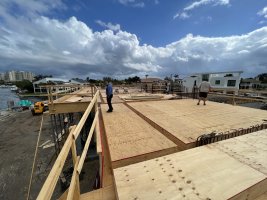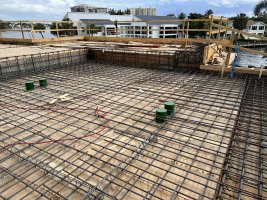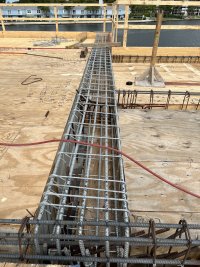-
Welcome to The Building Code Forum
Your premier resource for building code knowledge.
This forum remains free to the public thanks to the generous support of our Sawhorse Members and Corporate Sponsors. Their contributions help keep this community thriving and accessible.
Want enhanced access to expert discussions and exclusive features? Learn more about the benefits here.
Ready to upgrade? Log in and upgrade now.
You are using an out of date browser. It may not display this or other websites correctly.
You should upgrade or use an alternative browser.
You should upgrade or use an alternative browser.
Pouring the 2nd floor slab on a SFR
- Thread starter jar546
- Start date
bill1952
SAWHORSE
Starter home, huh?
Mr. Inspector
SAWHORSE
Is all of that required in your area or is it over kill?
jar546
CBO
We are in a 170mph wind zone, exposure D on a barrier island in VE & AE flood zones subject to storm surge. I don't know if its overkill but for the size of the houses and complexity, it seems appropriate. There is nothing structurally prescriptive about a home like this.Is all of that required in your area or is it over kill?
jar546
CBO
Single family home. Lucky to have any protection at all.First picture … looks like a fall hazard, the guardrail in the foreground has exposed a hole in the plywood deck someone could fall through.
brokenkeys
Member
Gotta love exposure D. Combine with risk category 4 and it ends up looking like there's more steel than concrete.
If it were mine, I would have pushed for corrosion resistant rebar, given the location and price point.... but then again, given the price of corrosion resistant bars, I would probably lose that debate.
If it were mine, I would have pushed for corrosion resistant rebar, given the location and price point.... but then again, given the price of corrosion resistant bars, I would probably lose that debate.
The homeowner is probably 80 yrs old and figures any rebar corrosion issues will not happen in his lifetime.If it were mine, I would have pushed for corrosion resistant rebar, given the location and price point....
Regarding the rust on the rebar. I see nothing to worry about. If there was a reduction in cross section of the steel yes, there would be a concern and the rebar would likely have to be replaced before pouring concrete. ACI is clear that tight surface rust is not a concern. It would be appropriate to wire brush off loose rust.
Rusting of the rebar is inhibited by the PH of the concrete. Concrete cover limits access of water and oxygen to the reinforcing. In addition the building waterproofing system further limits the ability of water to get in contact with the reinforcing.
Corrosion resistant rebar is not a well defined term. But more relevant is the fact that efforts to limit rust, beyond the code provisions, are generally not warranted or used.
Rusting of the rebar is inhibited by the PH of the concrete. Concrete cover limits access of water and oxygen to the reinforcing. In addition the building waterproofing system further limits the ability of water to get in contact with the reinforcing.
Corrosion resistant rebar is not a well defined term. But more relevant is the fact that efforts to limit rust, beyond the code provisions, are generally not warranted or used.
Sifu
SAWHORSE
- Joined
- Sep 3, 2011
- Messages
- 3,568
If not mistaken, most corrosion resistant rebar can't be field modified either. Or do I have that wrong?Regarding the rust on the rebar. I see nothing to worry about. If there was a reduction in cross section of the steel yes, there would be a concern and the rebar would likely have to be replaced before pouring concrete. ACI is clear that tight surface rust is not a concern. It would be appropriate to wire brush off loose rust.
Rusting of the rebar is inhibited by the PH of the concrete. Concrete cover limits access of water and oxygen to the reinforcing. In addition the building waterproofing system further limits the ability of water to get in contact with the reinforcing.
Corrosion resistant rebar is not a well defined term. But more relevant is the fact that efforts to limit rust, beyond the code provisions, are generally not warranted or used.
Msradell
SAWHORSE
That is completely true for fiberglass rebar and somewhat true for epoxy coated rebar which according to most resources can have a coating reapplied in the field if it cracks off. However, that being said, ACI code in most cases will not allow any field bending of rebar that is larger than #4 or #5, I forget which office happened my head. Some of this is much larger than that anyway.If not mistaken, most corrosion resistant rebar can't be field modified either. Or do I have that wrong?
jar546
CBO
A lot of the steel is delivered already bent for the specific application. The bigger stuff that is.
ACI 318 doesn't say that... I agree, it is not prohibited. I will agree with you that field tools most likely do not get the correct radius; however, that is because they typically use the tail or a section of pipe to get the bend, and not the proper tool with a template for the bend.Where does it say you cannot field bend larger bars? The issue is the bend diameter. Admittedly most field tools are not capable of bending larger sizes.
ACI 318 - 26.6.3 Bending
26.6.3.1
Compliance requirements:
(a) Reinforcement shall be bent cold prior to placement, unless otherwise permitted by the licensed design professional.
(b) Field bending of reinforcement partially embedded in concrete shall not be permitted, except as shown in the construction documents or permitted by the licensed design professional.
(c) Offset bars shall be bent before placement in the forms.
Msradell
SAWHORSE
As others have said I don't believe the ACI code says that Bars cannot be bent in the field however a large majority of the specifications for projects are written with a notation in the notes stating that bending of rebar in the field is prohibited. Sometimes I allow it for smaller sizes (<#6 and however).Where does it say you cannot field bend larger bars? The issue is the bend diameter. Admittedly most field tools are not capable of bending larger sizes.
jar546
CBO
I don't believe that is correct, at least not in any State that I worked in. There may be some Building Departments that feel that way but that is not written into the law.So if the constructions say that something cannot be done but the building department says that it can, the building department is effectively acting as the engineer of record.
Mark, I think you are taking this to the extreme due to your prejudice against code officials. You are reading way to far into what was said. I think what some are trying to say is....So if the constructions say that something cannot be done but the building department says that it can, the building department is effectively acting as the engineer of record.
If a BO is asked if field bent bars are permitted, the BO should say "Yes, where compliant with ACI 318 Sec. 26.6.3.1 and not prohibited by the EoR."
Code officials, when asked a generic question, must answer to the code. If asking a project specific question, they should answer with the code requirement and the project specification.
That said, a contractor should look at the plans and know the code themselves so that they don't need to ask these questions.
That’s a big can of worms. The contractor needs to know how to read and follow cd’s, and means & methods. The AoR needs to follow code when creating the cd’s.That said, a contractor should look at the plans and know the code themselves so that they don't need to ask these questions.
If the plans state that rebar shall not be field bent, such a statement will be in the notes. It might be in the general notes or the concrete notes. Now I can't speak for the rest of the crowd but it's rare that I would take the time to read all of the notes.So if the constructions say that something cannot be done but the building department says that it can, the building department is effectively acting as the engineer of record.
If asked I would wonder if Olaf has the strength to get past #5 bar. If a mechanical bender was used in the field...what's the difference from doing that at a facility. I can envision an issue with bending epoxy coated rebar in that the epoxy might deform.
Last edited:
Done in the factory, they would take the time to patch any damaged epoxy coating. And in the field, they could he tempted to heat the rebar red hot with an acetylene torch to make it bend easier.. If a mechanical bender was used in the field...what's the difference from doing that at a facility.
I considered the use of a torch and thought it too remote of a possibility….beyond that, there would be signs.Done in the factory, they would take the time to patch any damaged epoxy coating. And in the field, they could he tempted to heat the rebar red hot with an acetylene torch to make it bend easier.
Msradell
SAWHORSE
Heating epoxy coated rebar or any other type of rebar for that matter is strictly prohibited by ACI codes! Heating it can adversely affect the strength of the steel in many cases. A big advantage of shop bending versus field bending is that the bends are performed in a slow continuous motion using hydraulics instead of rapid sharp jerks is usually what you see with a manual Bend.Done in the factory, they would take the time to patch any damaged epoxy coating. And in the field, they could he tempted to heat the rebar red hot with an acetylene torch to make it bend easier.




